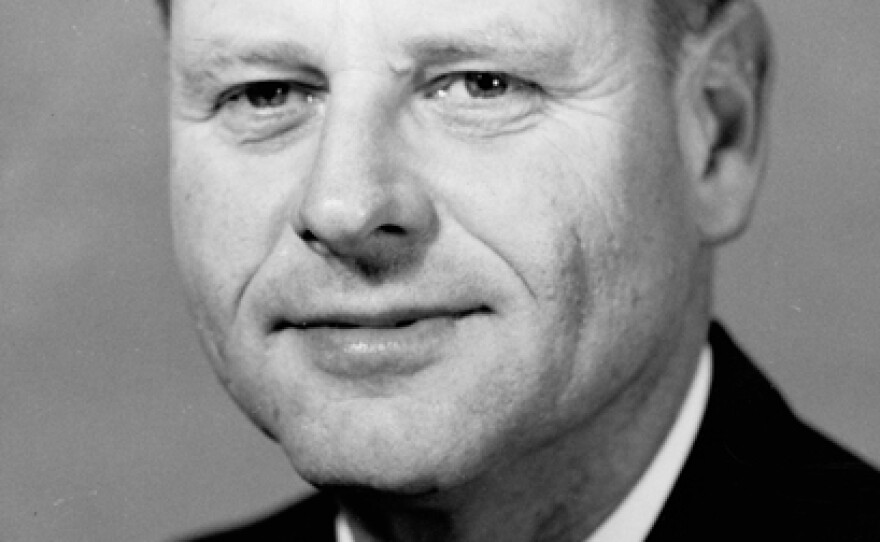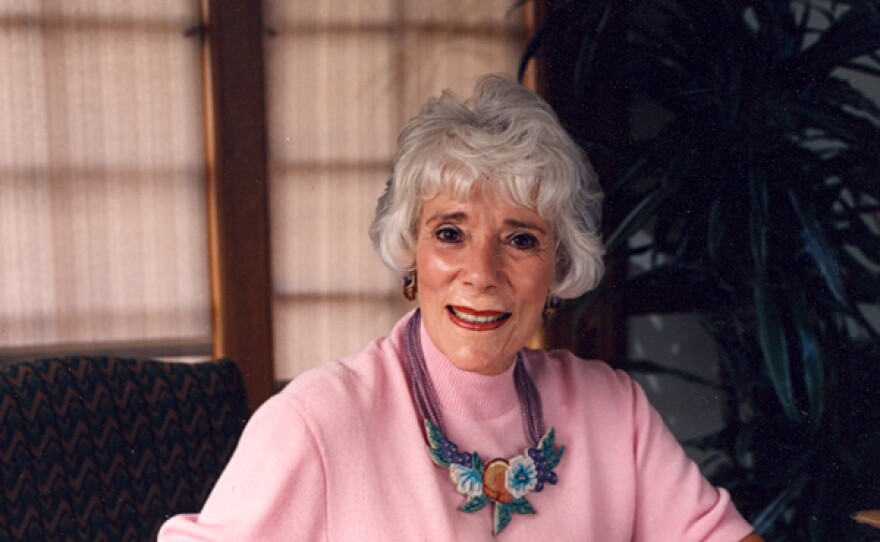
As part of KPBS’ 50th anniversary, the newly established Hall of Fame serves to honor the extraordinary individuals and families while providing inspiration for the future generations.
These charter inductees are very diverse in their contributions and accomplishments, but they share one common characteristic: the vision and dedication to help KPBS grow and thrive in the San Diego community for future generations.
The KPBS Hall of Fame consists of two designations: Lifetime Achievement and Visionaries. Lifetime Achievement inductees are former staff whose pioneering work set new standards for public media. The Visionaries category honors extraordinary individuals and families who have made gifts of $1 million or more to KPBS.
Honorees in the Lifetime Achievement category include: Ken Jones, founder of KEBS (now KPBS); Paul Marshall, Emmy Award winning television producer; Tom McManus, former radio Station Manager (1968-1988); Paul Steen, former General Manager and John Witherspoon, the station’s first General Manager.
The Visionaries include: The Copley Family, Dr. Irwin and Joan Jacobs, Joan Kroc, Price Family Charities, Arthur and Jeannie Rivkin, Donald and Darlene Shiley and the Viterbi Family. A brief bio for each inductee follows.
Lifetime Achievement Honorees

Ken Jones was a speech communications professor at San Diego State College (now SDSU) and spent years pushing for an educational radio station on campus. His vision was realized on September 12, 1960 when KEBS went on the air (now KPBS). Jones went on to make sure KEBS thrived and added the TV station a few years later. Affectionately called the "founding father" of KPBS, Jones died in the fall of 2009 at the age of 90.

Paul Marshall began working for KPBS in 1967 as the station’s first television production manager. Marshall created and served as Executive Producer for the Emmy Award winning series, Club Date, which KPBS produced and distributed during the 1980s and 90s. The series was accepted as a complete collection now residing in the Library of Congress’ Jazz Music section. Marshall left KPBS in 1992 after 25 years of service.
Tom McManus was the first full time employee of KPBS, serving as the radio station’s Program Director and later Station Manager from 1968-1988. During his public broadcasting career, McManus served on the board of directors of National Public Radio from 1974-1977. He was also a founding member and former president of California Public Radio, a statewide association of 21 public radio stations. McManus died in 2002.
Paul Steen was a former General Manager of KPBS, overseeing both the radio and television stations from 1974-1992. He began his career at KPBS in 1967 as a producer when the public broadcasting television station first went on the air. During Steen’s term, KPBS accomplished broadcast history by transmitting the first ever over-the-air digital HDTV signal. While General Manager, Steen made the decision to change KPBS radio to all news and public affairs in 1990. Steen retired from KPBS in 1992.
John Witherspoon was the first General Manager of KEBS (now KPBS). He played an important role in the creation of the Public Broadcasting Act which established the Corporation for Public Broadcasting (CPB). Witherspoon was present at the bill’s signing alongside President Lyndon Johnson in 1967. He was asked to serve as the first Board Chairman of National Public Radio, as a result of his involvement on the national level. Witherspoon left KPBS in 1974.
Visionary Honorees

The Copley Family, under Helen Copley’s leadership, recognized the journalistic integrity of KPBS and began contributing to the station regularly in 1980. The Copley’s contributed $2.1 million to the Campaign to Make a Difference - the campaign to build the current broadcast center. David Copley and Judith Harris co-chaired the Campaign to Make a Difference and successfully raised more the $7 million to fund the construction of the Copley Telecommunications Center at KPBS. The facility opened its doors in 1995 and currently houses administrative offices as well as broadcast and production studios. The Radio Performance Studio is also named after David Copley.
Dr. Irwin and Joan Jacobs have been members of the Producers Club since the late 1970s. As sponsors of the Campaign to Make a Difference, the Jacobs’ are among the station’s most generous donors. Through Linkabit and Qualcomm, which Irwin co-founded, the Jacobs’ were one of the first underwriters on KPBS supporting various programs including Nova. In recognition of their support, KPBS named several spaces in the current building after the Jacobs Family including Studio B and the Radio Broadcast Center. A 2008 gift established a multi-platform training program for future journalists known as the Jacobs Lab. A gift in 2009 from the Jacobs begins the process of redesigning the 2nd floor at KPBS to create a multi-media newsroom of the future.
Joan Kroc’s relationship with KPBS and public radio began in the 1980s. She was a major supporter in the Campaign to Make a Difference, generously funding the equipment for the KPBS production center, for which she is prominently recognized inside KPBS. Kroc was a keen listener of public radio and viewer of public television. She valued KPBS as a local source of national and local public radio. Among the many gifts she bestowed upon her death in 2003, one of the largest was granted to NPR in excess of $200 million. She also bequeathed $5 million to KPBS.
The Price Family, Helen and Sol Price, along with their sons Robert and Larry, are among KPBS’ most loyal and generous donors. The Prices’ first joined KPBS in the mid 1970s. Through Price Charities, Sol underwrote the Newshour with Jim Lehrer (now PBS NewsHour) and enabled KPBS to rehire three key producers in 1990 after cuts in the operating budget. The Price Family also contributed to the Campaign to Make a Difference in the early 1990s. The area outside digital editing suites on the first floor of the Copley Telecommunications Center recognizes the Price Family for their generous support in constructing the present facility. Sol Price died in 2009 at the age of 93.

Arthur and Jeannie Rivkin gave their first contribution to KPBS in 1971. In 1984, they became members of the Producers Club and later became major contributors to the Campaign to Make a Difference and the campaign for the KPBS Digital Future. They and their family have also been generously supporting children’s programming for more than 10 years. Their contributions are recognized throughout the current building including the first floor digital editing suites and the KPBS Newsroom.
Donald and Darlene Shiley, since the early 1980s, have made many significant contributions to the station including the Campaign to Make a Difference. In honor of their leadership gift, KPBS’ TV production Studio A was named the Shiley Studio. They have generously supported arts and performance programming on KPBS for more than 10 years with gifts to the Shiley Arts and Culture Programming Fund. Darlene appears frequently on KPBS in spots which talk about her and Donald’s love for and support of arts programming on KPBS. Donald recently passed away at age 90.
The Viterbi Family has supported KPBS since 1988. A very generous gift from the family enabled KPBS to become the first PBS station to convert to High Definition broadcasting and made it possible for KPBS to construct and equip the most up to date digital production studios. Various areas of the current building bear the Viterbi Family name including the digital editing suites and the screening and interview room in the radio studios. The area in front of the Copley Telecommunications Center is named the Viterbi Digital Plaza in their honor.





